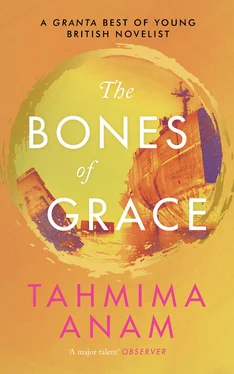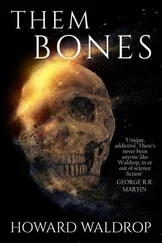‘He’s fine, thank you.’
I tried to detach myself, but she grabbed hold of my arm. ‘Newlyweds. So romantic. Better enjoy it before the babies come.’
I felt a hand on my shoulder, and it was Ammoo. ‘I’m going with Salma and the other lawyers — do you have a car, or do you want to go with your father?’
‘I’ll go with Abboo,’ I said. ‘What are we doing at the courthouse?’
She squeezed my hand. She had forgiven me, or perhaps forgotten altogether. ‘They’re opening it to the public today.’
I stuffed a few samosas into my mouth as the plate hovered near me, and then followed my father downstairs and into his car.
‘The road looks clear,’ Abboo said, looking ahead to assess the traffic.
‘I have no idea what’s going on.’
He peeled his eyes away from the road. ‘Don’t you read the newspaper? They’re announcing the Ghulam Azam verdict today.’
Of course. Only a person whose head was buried deep in the sand wouldn’t know that. I was reminded again of the difference between my parents’ household and Rashid’s — the conversation around the dinner table last night had been about the rising cost of labour and how so-and-so had to shut down their factory because the workers had gone on strike. ‘I’m sorry. I’ve been busy.’
‘A big day for your mother. Try to be supportive.’
‘I am supportive.’
‘She feels you don’t care about the trial.’
A car stopped abruptly in front of us, and Abboo jammed his hand on the horn. I knew my parents questioned whether I cared about the country as much as they did, and I had never really felt the need, or had the courage, to confess that I did not. I was proud that they had been in the war, proud to call my parents freedom fighters, but in reality I resented the space that it took up, the way all their conversations would eventually rotate back to reminiscing about the war, as if there was nothing but a bead curtain between this moment and that, so that all it needed was a brush against history to reveal the shiny betterness of the past. It was difficult to compete with, even more difficult to imagine that my life would ever amount to anything significant. They often said that the country lived in the shadow of that moment, that because the deaths had never been fully accounted for there was no way to move on, but what they never admitted was that it wasn’t just the dead, or their families, who felt the dark cloud of those nine months following them wherever they went, but the rest of us, the children of the people who survived, all of us burdened with what we couldn’t do, our imaginations limited by the protean, whereas theirs were set free by having done the impossible.
We pushed through the crowd of reporters and cameramen who had gathered at the entrance to the courthouse. I had only seen the building from the outside — a classical façade made grand by its brilliant white colour — and now, up close, it was impressive, wide marble corridors with double doors leading to the individual courtrooms. As we followed the group up the stairs through the corridor on the upper floor, we found Ammoo. She caught my eye and waved, and I noticed that her features were somehow rearranged, made bigger by the event, and I wondered if this was the face she had worn throughout the war, the look of majesty that comes over a person when she is assured of her role at a crucial moment in history. She entered the courtroom and the doors shut behind her, and we stood and waited outside. Abboo reached over and took my hand. I couldn’t remember a single question I wanted to ask him; all the curiosity I had gathered up the evening before vanished in the dusky light of this afternoon and the cluttered murmur of the crowd. I saw a few familiar faces, friends of my parents, colleagues, people who I might have gone to school with. A chant rose up and gathered volume. ‘Death!’ I heard. And then: ‘Hang him!’
The door opened and we fell silent, but it was just someone leaving. He waved his hand to indicate his irrelevance, then shut the door behind him and ducked away. I saw a woman holding the hand of a small child, and remembered a story my parents liked to tell me about how they had taken me to Suhrawardy field to attend the mock trial of Ghulam Azam. Back then, twenty years ago, only a fake trial for this man could be held, with actors playing the prosecution and a stuffed effigy in place of the real villain. He had been found guilty, sentenced, and executed at that trial, but it had all just been play, not like now, when Azam and the other men like him were in fear of their lives, their pasts finally catching up with them. That’s why my mother defended this government, no matter what its other sins might be, because it was the first time, and the only time, that anyone had made Azam account for what he had done. The man was heavy with the dead, and now he was standing in front of a judge and being asked to explain the deaths of children, and he would have nothing to say. He was old now, over ninety. His reckoning had come late, but it had come, and I was here to witness it. I swelled with the weight of the moment, understanding what it was, possibly for the first time, to be my mother’s daughter.
The door opened again and the news spread in a ripple, passed on from one person to the next until someone announced, ‘Life imprisonment!’ Cheers clashed with shouts of disappointment. Everyone started talking at once and trying to push into the courtroom. Abboo’s hand was still gripping mine, and we were moved along until we were close to the doorway. I peered inside and saw a group of people surge towards the front of the room, raising their hands up to the bench to get the attention of the judge. People held their cell phones above their heads and took photographs. Finally the crowd became so thick that I couldn’t hold on to Abboo’s hand and we were separated.
After a few minutes there was a commotion as Ghulam Azam was led out of the courtroom. A ring of policemen surrounded him, but they could only move very slowly, and as they passed me I took a good look at him. He was in a wheelchair, his feet apart but his knees pushed together. His hands were cuffed in front of his body, a cap stiff and large on his tiny face. One of the policeman had placed an almost kindly hand on his shoulder as they processed slowly out of the courtroom. Ghulam Azam would be taken to prison that day, and a year later he would die, mourned by people all over the world who didn’t know, or didn’t care, about what he had done. My mother would repeatedly curse her computer screen as she read the stories of the crowds that showed up at his funeral, her triumph diminished every time he was referred to as ‘Professor’, every time he was written about as a religious leader rather than what he really was — a murderer. But that was later. On this day, the satisfaction was substantial, if not complete, a guilty verdict, a sentence, and he sitting birdlike in a wheelchair with only a policeman for company. As for me, catching those glimpses of the man, my own father solid and devoted somewhere in the room, I hung in the balance. My own discovery contracted and swelled like the chambers of a heart, and one moment I decided I didn’t need to press my matter forward, because, as Rashid had reminded me, I was loved and that should be enough. But in another, the desire to resolve my story, to call time on the silence that had surrounded me, was inescapable, and finally it was this urge that won, and as soon as the scales had tipped, I couldn’t wait another moment. Ghulam had trumped me, but now that he was finally defeated it was my turn. I jostled my way towards the exit, pushing against the tide of people, the only one going the other way, until I was spat out of the building, struggling for breath as I reached the gardens outside the courthouse.
Читать дальше












